by Lisa Cooke | Nov 27, 2013 | 01 What's New, History, Newspaper
We just celebrated the 150th anniversary of President Abraham Lincoln’s now famous speech at the dedication of the Gettysburg Cemetery, a national
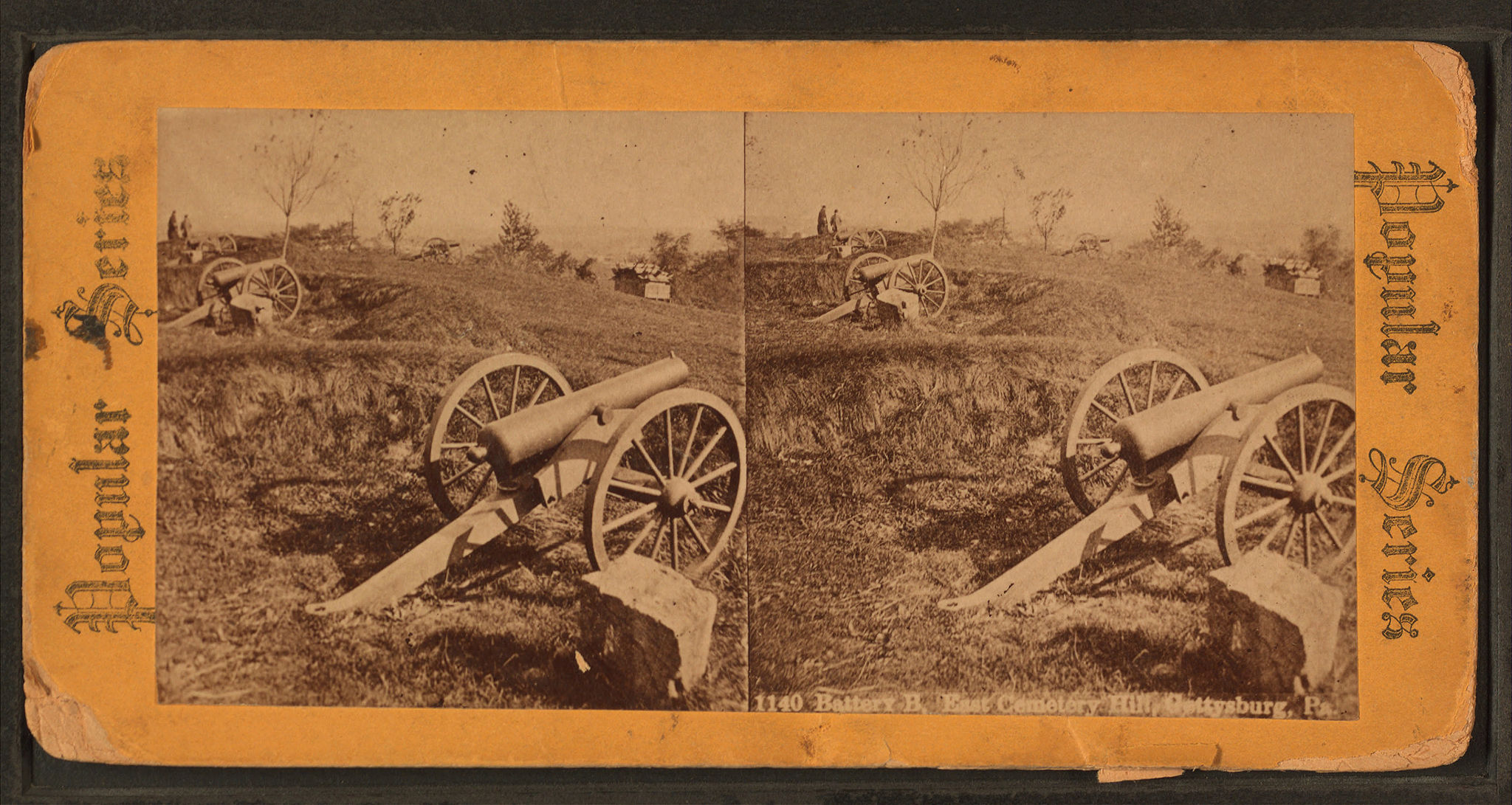
Battery B, East Cemetery Hill, Gettysburg, Pa, from Robert N. Dennis collection of stereoscopic views. Wikimedia Commons Image.
cemetery created at the site of one of the bloodiest battles of the Civil War.
Presidents give a lot of speeches–and most are never remembered. But the Gettysburg Address, as it came to be known, was immediately appreciated as something special. The press described it as “a perfect gem…unexpected in its verbal perfection and beauty.”
150 years ago today The Caledonian newspaper reprinted the entire speech. (Don’t stop there: you can read high-resolution digital versions of all five of Lincoln’s handwritten copies of the address and learn all kinds of things about the Address at the Google Cultural Institute.
The Gettysburg Address is part of the genealogy of every American whose ancestors lived through the Civil War. Few were unaffected by the War, whether they lived in the North, South or further West. Certainly its tensions and outcomes shaped the nation’s economy, social mores and more for decades to come.
Life-shaping battles and other events–and responses to them like the Gettysburg Address–appear in newspapers. That’s why I love teaching genealogists about using newspapers, and why I wrote the book How to Find Your Family History in Newspapers. The “daily news” of the past tells us what people were doing and saying and why.
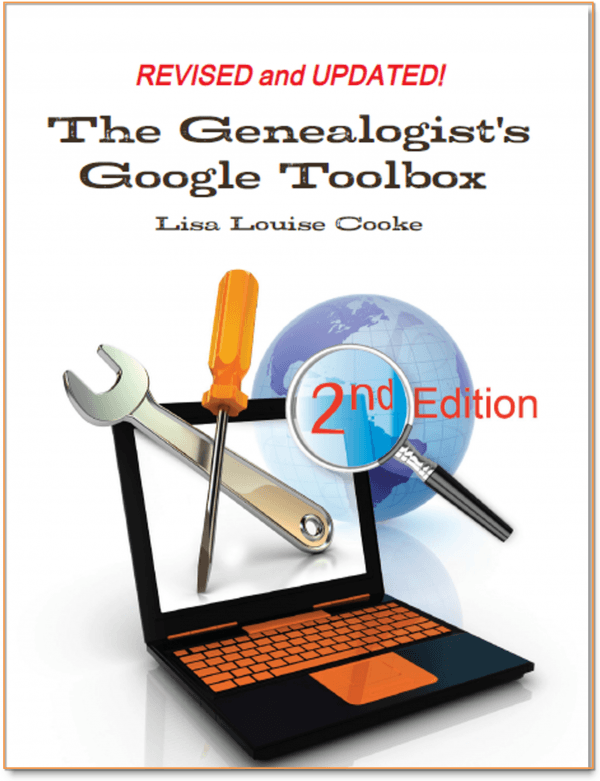 If you’re wondering what the Google Cultural Institute (GCI) is, you’re not alone. It’s a less-heralded but really important part of what Google offers. The GCI is a Google effort launched in 2011 to “make important cultural material available and accessible to everyone and to digitally preserve it to educate and inspire future generations.” (From GCI FAQ.) As of mid-2013, over 6 million photos, videos and documents are on the site, including all kinds of international cultural materials. If you haven’t explored the many Google tools helpful to genealogists, I suggest you read my book The Genealogist’s Google Toolbox. Either of these books will make a great holiday gift to yourself–and your research!
If you’re wondering what the Google Cultural Institute (GCI) is, you’re not alone. It’s a less-heralded but really important part of what Google offers. The GCI is a Google effort launched in 2011 to “make important cultural material available and accessible to everyone and to digitally preserve it to educate and inspire future generations.” (From GCI FAQ.) As of mid-2013, over 6 million photos, videos and documents are on the site, including all kinds of international cultural materials. If you haven’t explored the many Google tools helpful to genealogists, I suggest you read my book The Genealogist’s Google Toolbox. Either of these books will make a great holiday gift to yourself–and your research!
by Lisa Cooke | Jun 4, 2015 | 01 What's New, Family Reunions, Google, History, images, Newspaper, Technology, United States, Video
 It’s common to hear of long-lost relatives who rediscover each other online or through DNA tests. But nearly 100 years ago, another new technology–the radio–united a pair of long-lost siblings 40 years after one ran away.
It’s common to hear of long-lost relatives who rediscover each other online or through DNA tests. But nearly 100 years ago, another new technology–the radio–united a pair of long-lost siblings 40 years after one ran away.
This newspaper article reports that Alonso Jones’ children were sitting around one day in 1926 listening to the radio. Then they heard the announcer say, “Alonso Jones, wherever you are, listen…Your sister wants to see you at Worthington, Ohio. She has not seen or heard from you in forty years. You were born at Antiquity, Meigs County, Ohio, at the time of the Civil War….”
“You were reared by Captain William Roberts, an Ohio River flat boat man. You went with him on a produce boat when you were a boy and ran away while the boat was lying at the bank in Arkansas.” The article reports that the man telegraphed his sister and arranged to meet her. What a great story! And what a great family history find for anyone researching Alonso Jones or his sister, Mrs. Robert Eakin, or his guardian, William Roberts!

Salt Lake Tribune, January 1, 1926, p. 1. Digitized at Ancestry.com.
This article illustrates two fantastic tips for newspaper searching.
FIRST, I originally found this article in the Salt Lake Tribune, digitized at Ancestry. I was struck because the story was about people from Ohio and Arkansas–not Salt Lake. As we still see today, local news stories of the past were often reported in other cities. When searching digitized newspapers, don’t automatically discount search results that otherwise seem right but appear in out-of-town papers.
SECOND, curious about this story, I used Lisa’s search strategies from her book, The Genealogist’s Google Toolbox to search for more information about the people mentioned in the article. I got a hit on a possible match for the riverboat caption. I also found that the Google News Archive had this same article in The Evening Independent in St. Petersburg, Florida (shown above). The copy above is much clearer to read and slightly different. For these reasons, it can sometimes be worth looking for duplicates of news articles and/or obituaries for your relatives.
 Want to learn more? Genealogy Gems Premium members can also listen to Premium podcast episodes GGP 36 and 3GGP 37 about newspaper searching (Lisa talks about Google News Archive in episode 37). Or get the ultimate scoop in How to Find Your Family History in Newspapers! It’s packed with inspiring family history finds in the newspaper and all the tools you need (online and offline) for finding your own.
Want to learn more? Genealogy Gems Premium members can also listen to Premium podcast episodes GGP 36 and 3GGP 37 about newspaper searching (Lisa talks about Google News Archive in episode 37). Or get the ultimate scoop in How to Find Your Family History in Newspapers! It’s packed with inspiring family history finds in the newspaper and all the tools you need (online and offline) for finding your own.
by Lisa Cooke | May 31, 2017 | 01 What's New, Google Earth, Maps |
The Newberry Library’s online Atlas of Historical County Boundaries is finally fully updated and interactive! Read the good news here–and my preference for using the powerful geographic data that drives the Atlas.
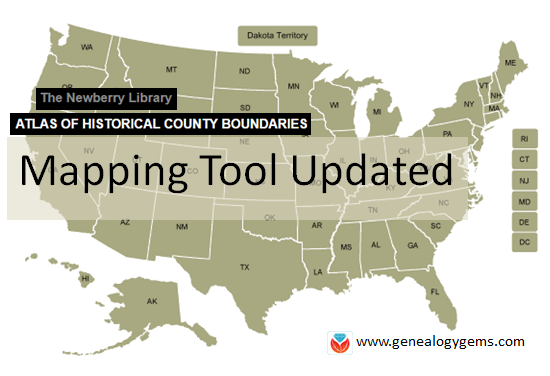 The Atlas of Historical County Boundaries at The Newberry Library’s website has been undergoing upgrades for quite some time. Genealogists who rely on this fantastic online resource to research old county boundaries in the U.S. have been able to access the basic data that drives the map (dates and geographic boundary changes). But they haven’t been able to use the popular interactive map. Great news: the Atlas is finally fully interactive again.
The Atlas of Historical County Boundaries at The Newberry Library’s website has been undergoing upgrades for quite some time. Genealogists who rely on this fantastic online resource to research old county boundaries in the U.S. have been able to access the basic data that drives the map (dates and geographic boundary changes). But they haven’t been able to use the popular interactive map. Great news: the Atlas is finally fully interactive again.
Changing Boundaries Reflected in the Atlas of Historical County Boundaries
Understanding changes in county boundaries over time is key to doing genealogy research in the United States. Boundaries have changed repeatedly–and some dramatically. County governments typically keep important genealogical sources: vital records, court records, land records and more. We need to know which county would have housed our ancestors’ records during specific time periods so we can find the records we want.
What’s New at the Atlas of Historical County Boundaries
According to the Newberry Library’s press release, users can now:
- view a base layer map that allows an overlay of boundaries on top of cities, towns and other geographic features;
- zoom in and out of maps and expand the view to full screen;
- select a date of interest from a drop-down box with all border change dates for that state; and
- view information about border changes in a hover box that changes as users hover over different counties.
Here’s what the new interface looks like:
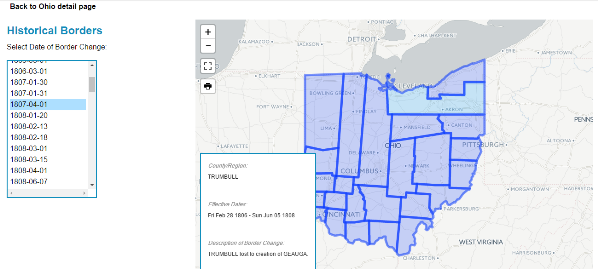
Google Earth Pro vs. the Atlas of Historical County Boundaries
It’s great to see improved functionality on the Atlas site. But after reviewing the update, I still think the experience of using data from the site is superior in the free Google Earth Pro (GEP) program. To use the entire data set in Google Earth Pro, simply download the KMZ data file onto your computer,and when you click to open the file, your computer will detect the KMZ format and know to automatically open Google Earth Pro (as long as you already have GEP installed on your computer.)
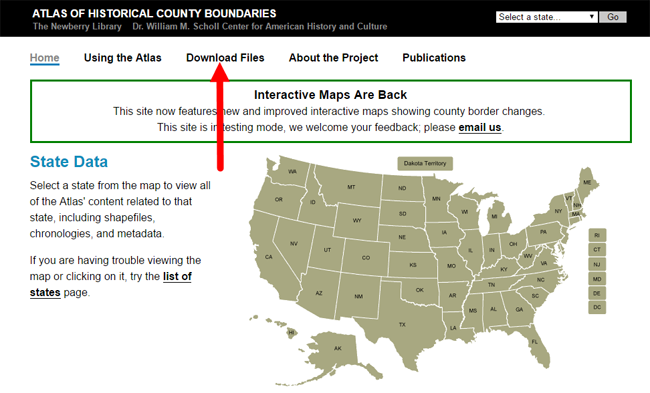
Using the file in GEP allows you to use the data in conjunction with the rest of your genealogical information (such as placemarks indiciating places lived & schools attended, historic map overlays, embedded old family photos and home movies, etc.). This provides a more integrated genealogical research experience. Learn more by clicking here to watch a free video I’ve made about using Google Earth for genealogy.
by Lisa Cooke | May 6, 2018 | 01 What's New
Here’s the latest news from the Federation of Genealogical Societies and their 2018 conference. FOR IMMEDIATE RELEASE 3 May 2018 – Austin, Texas Registration is open for the Federation of Genealogical Societies Annual Conference in Fort Wayne, Indiana 22-25...

 If you’re wondering what the Google Cultural Institute (GCI) is, you’re not alone. It’s a less-heralded but really important part of what Google offers. The GCI is a Google effort launched in 2011 to “make important cultural material available and accessible to everyone and to digitally preserve it to educate and inspire future generations.” (From GCI FAQ.) As of mid-2013, over 6 million photos, videos and documents are on the site, including all kinds of international cultural materials. If you haven’t explored the many Google tools helpful to genealogists, I suggest you read my book The Genealogist’s Google Toolbox. Either of these books will make a great holiday gift to yourself–and your research!
If you’re wondering what the Google Cultural Institute (GCI) is, you’re not alone. It’s a less-heralded but really important part of what Google offers. The GCI is a Google effort launched in 2011 to “make important cultural material available and accessible to everyone and to digitally preserve it to educate and inspire future generations.” (From GCI FAQ.) As of mid-2013, over 6 million photos, videos and documents are on the site, including all kinds of international cultural materials. If you haven’t explored the many Google tools helpful to genealogists, I suggest you read my book The Genealogist’s Google Toolbox. Either of these books will make a great holiday gift to yourself–and your research!



 The
The 
